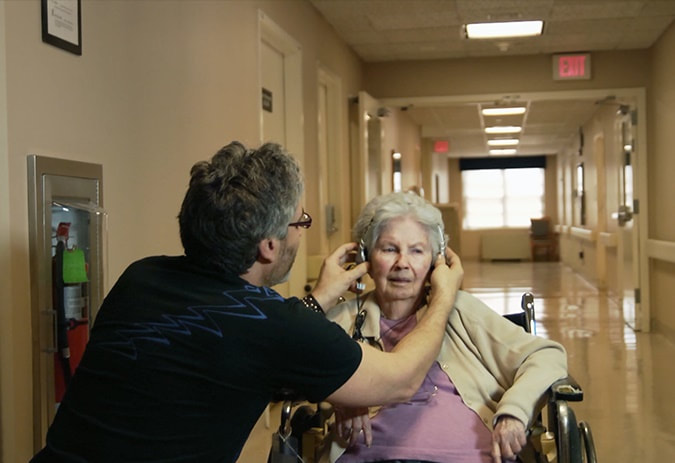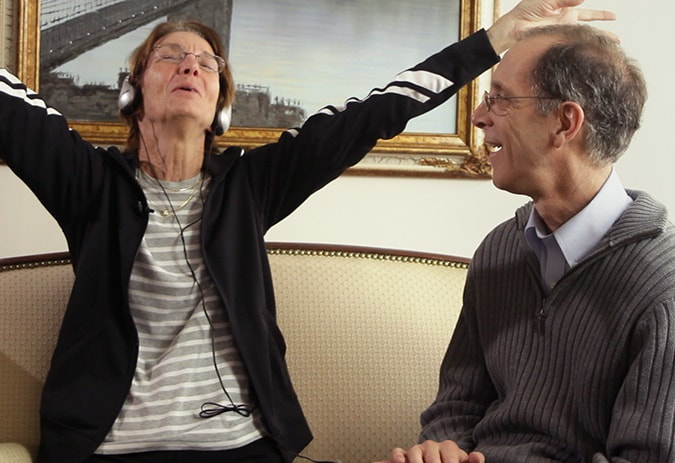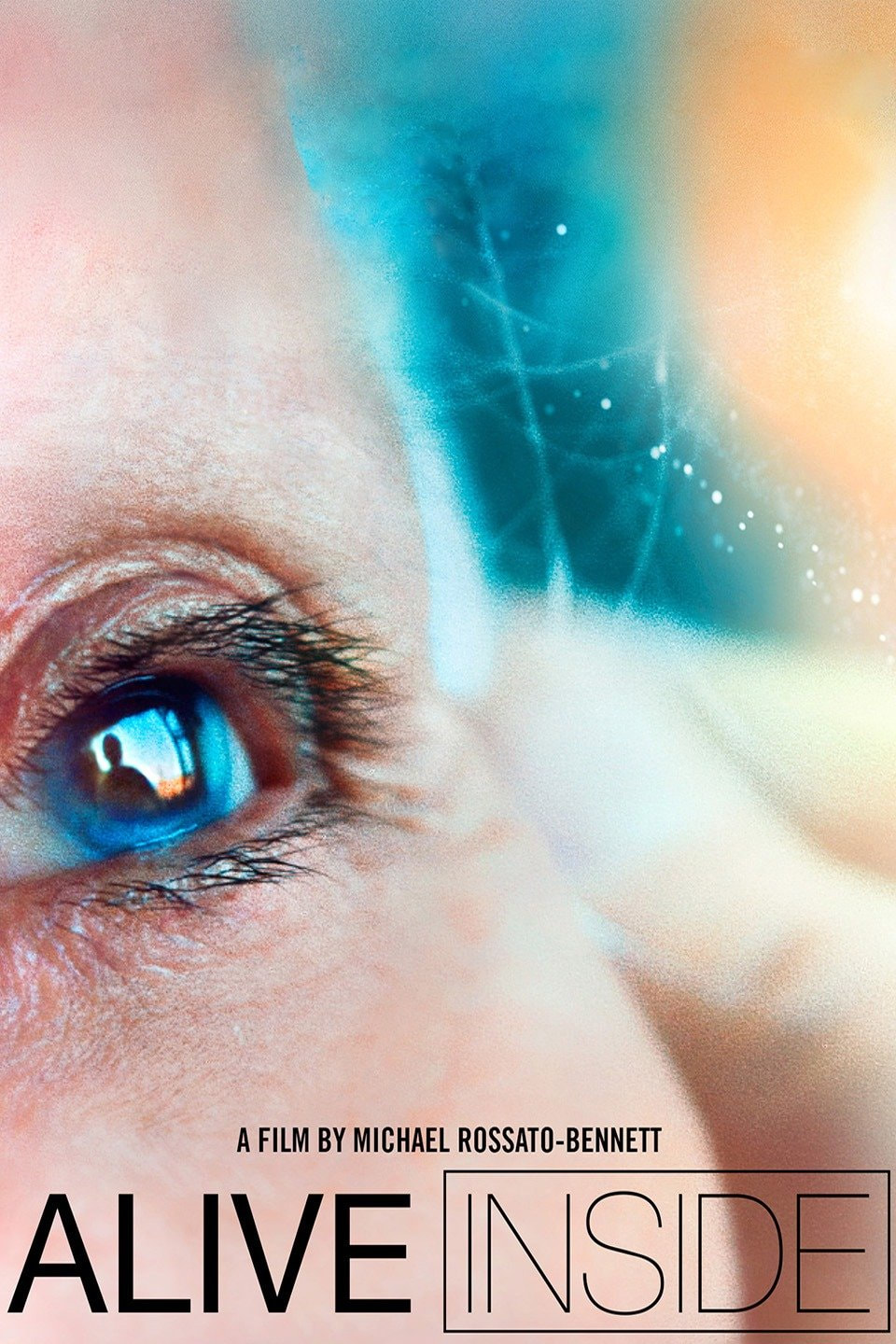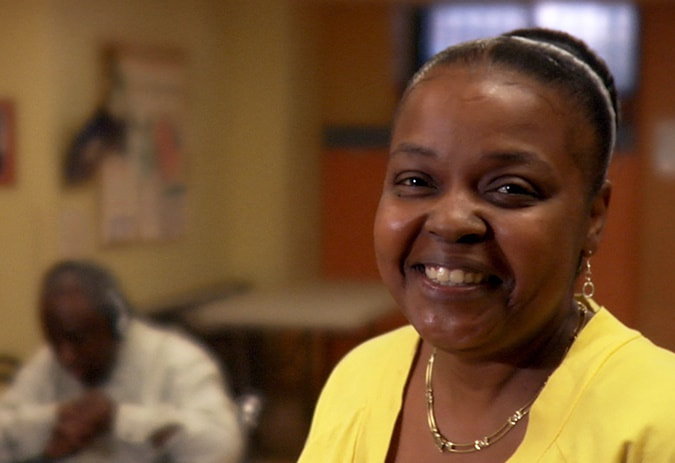There's a Light Inside Us
and it's called Music
This is a resource page for those who want to think about the enlivening effects of music for people with Dementia and Alzheimer's -- and about the sense of connection that sharing music can bring for those who care for them, including youth. The page is being used among college students in a course called "Music-Community-Spirit" taught by Dr. John Krebs (Music) and Dr. Jay McDaniel (Religion) at Hendrix College in Arkansas. The students in the course did a "service learning" project in which they sang at local assisted living centers. Feel free to use materials from the page in any way you like.
Alive Inside
A Film That's Changing the Way
We Think about the World
About the FilmALIVE INSIDE is a joyous cinematic exploration of music’s capacity to reawaken our souls and uncover the deepest parts of our humanity. Filmmaker Michael Rossato-Bennett chronicles the astonishing experiences of individuals around the country who have been revitalized through the simple experience of listening to music. His camera reveals the uniquely human connection we find in music and how its healing power can triumph where prescription medication falls short....This stirring documentary follows social worker Dan Cohen, founder of the nonprofit organization Music & Memory, as he fights against a broken healthcare system to demonstrate music’s ability to combat memory loss and restore a deep sense of self to those suffering from it. Rossato-Bennett visits family members who have witnessed the miraculous effects of personalized music on their loved ones, and offers illuminating interviews with experts including renowned neurologist and best-selling author Oliver Sacks (Musicophilia: Tales of Music and the Brain) and musician Bobby McFerrin (“Don’t Worry, Be Happy”). An uplifting cinematic exploration of music and the mind, ALIVE INSIDE’s inspirational and emotional story left audiences humming, clapping and cheering at the 2014 Sundance Film Festival, where it won the Audience Award. Making the FilmPodcasts about "Alive Inside" |
The Spiritual Sideto quicken: to come to life, to shine more brightly, even if only for a moment Applying Alive Inside in Mexico |
It's All About Empathy and Connection
The Philosophy Within the Film
|
|
"Empathy means you feel the life bubbling inside another being -- that their life matters to you -- that you know you can know them, feel them, and even for a moment become them -- and that together you are part of a web of life. This is the antidote to the epidemic of loneliness that is sweeping the world: greed, seeing people, animals, and the planet as "things' is creating an epidemic of disconnection, violence, sadness loneliness and destruction. This is not what we want. The opposite of this is the path of empathy. You know how to do this. It is in you. You do this with those you love. You do it with your pets. and when you do this the world becomes thick and life becomes meaningful. Now to experience yourself, to experience another, to experience life, it's hard. It's hard to be a mortal. To be alive inside. But life needs you. it needs your powerful heart. Others need you to awaken life in them. We want you to have these experiences we've had. You can awaken another human being and awaken yourself. Are you ready?"
|
The Power of Music on the Brain: Dementia and Parkinson's
For Further Study
The Music and Memory Foundation
|
Our ongoing research and evaluation of Music & Memory’s work in care organizations shows consistent results:
|
Intergenerational Moments of Aliveness
|
|
Calls to Action:
More from the Alive Inside Foundation
Where is God in Alzheimer's Disease?
A Theological Reflection by Bruce Epperly
When We are Alone and Afraid
Theology deals with the unfixable elements of life. Surely, God is present in moments of elation and success, and we give thanks for God’s providence that makes a way where there is no way and brings forth beauty with each new day. But, we need God most when we are alone, helpless, and afraid.
As a pastor, I have ministered with persons with Alzheimer’s. I must confess that Alzheimer’s frightens me more than almost any ailment. You see, I am a scholar: I rejoice in mental complexity, in forming new ideas, and in articulating imaginative and accessible ways of conveying insights and truths. My brain is my friend and I love writing and teaching. To me, the greatest fear is to know that I will eventually no longer have access to what has defined my life for nearly forty years. I can’t imagine a world without writing, lecturing, and reading. I can’t imagine not knowing at a conscious level my beloved wife, grandchild, son and daughter in law, and best friend. Yet, Alzheimer’s is a possibility that we aging baby boomers must contend with in our own journeys or among those we love.
A viable theology must provide insights for responding to suffering and helplessness. Denial won’t do, nor will statements that illness and tragedy are God’s will or punishment for sin. While Alzheimer’s may be related to lifestyle factors, no linear causal source has been found. A theologian must begin with the pain and acknowledge the brokenness of life and then seek to discern where God might be present in situations of human and non-human helplessness. Process theology does not solve the problem of evil or explain the relationship of God and Alzheimer’s but gives us some practical insights – and all viable theology must be practical – in responding to Alzheimer’s and other life-changing illnesses and tragedies.
God and Neurotransmitters
Process theology begins with the affirmation of God’s nearness. God’s love is intimate and bears the suffering of others. Whitehead describes God as the fellow sufferer who understands. Surely, Whitehead, the vicar’s son, knew the biblical affirmations: “nothing can separate us from the love of God” (Romans 8:39) and “if I ascend to the heights you are there, if I descend to the depths you are there.” (Psalm 139:8) Process theology affirms the reality of divine omnipresence. God is here in this moment, in every cell, and every soul. Even when I am unaware of God, God is moving through my life – omniactive, omnipresent, providential, and non-coercive. Persons with Alzheimer’s and their families are in God’s care and presence.
God’s nearness also pertains to God’s power. God does not cause everything that happens, nor does God punish evildoers with plague, pestilence, and disease. God works within human and non-human freedom to bring about the best results in every situation and over the long haul. What this means, practically speaking, is that God does not cause Alzheimer’s nor can God coercively determine every aspect of our lives, even at the cellular level. God is present in the synapses, chromosomes, and neurotransmitters, but even at this level, there is free play and the reality that things go amiss. While mortality is essential to creation, God does not – and cannot – pick and choose what eventually leads to our deaths.
Still God has power in every situation. God’s intimate love sustains caregivers and loving friends for the long companionship with persons with Alzheimer’s. God’s inspiration awakens communities of care and invites us to see the divine in ourselves and others even when it is disguised by forgetfulness and incapacity.
We are Remembered
Even When We Don't Know Our Name
God is also present in the lives of those diagnosed with Alzheimer’s. We can’t fully know what persons with Alzheimer’s experience. But, deep down, God is moving in their experiences. As the Apostle Paul says, the Spirit of God intercedes – or speaks within us – in sighs too deep for words. Could persons with Alzheimer’s experience God at a non-conscious and non-verbal level, perhaps as the mother or father who cradles us as infants or the ambient waters of the womb? Perhaps, this is God’s calling to us – to cradle and love without expectation of conscious response or reciprocity. There are times when we must simply, as caregivers, give without hope of return.
In my pastoral experience, there is a gentle faith movement in persons with Alzheimer’s not unlike the babbling of infants and toddlers that emerges as words. Persons who may not recognize their spouse, children, or pastor may still experience the grace of the Lord’s Prayer or a favorite hymn. Certain rituals may bubble up from the unconscious, inspired and inspiring a sense of wellness despite the tragic realities of Alzheimer’s. These and other remembrances invite caregivers to communicate in ways that open the channels of joy and memory.
Process theology asserts that God always remembers. God treasures and embraces each moment of experience. Nothing is lost. No pain or joy is forgotten, but every experience is woven into the tapestry of divine experience and sent back into the universe to bring greater beauty to the world. We are remembered, even if we don’t know our name. We are embraced, even when we can’t perform normal bodily functions on our own. We are cherished, even when we’ve lost the sense of a centered self.
A Foot on Earth and a Foot in Heaven?
Process theology affirms the possibility of everlasting life.[1] I believe that the stream of experiences of this lifetime continues after physical death. While we can’t fully comprehend the nature of everlasting life, I believe that persons with Alzheimer’s will be gently transformed – their forgetfulness will slowly be abated, memories emerge, and relationships reaffirmed – in a realm in which God’s aims for us can be experienced consciously as well as unconsciously. It is even possible that, as people suffer from Alzheimer's in this plane of existence; they simultaneously participate in another plane of existence: with a foot on earth and a foot in heaven. From a process perspective, this is a plausible hope. Indeed, one foot may be in hell, even as one is in heaven.
To close, theology as the inspiration to practice calls upon caregivers to recognize that persons with Alzheimer’s still are able to experience the world, albeit in very different and, from our limited perspective, limited and dysfunctional ways. God is still at work in their lives. Accordingly, our care – like the care we give to an infant – brings beauty and comfort. Experience is global and, that being the case, our care contributes to the most basic realities of life – the simple experience of well-being, safety, and touch.
I cannot with conscience give definitive counsel to persons recently diagnosed with Alzheimer’s. I can assert with humility that God is with us, and nothing can separate us from God’s love. I can hope prayerfully that we are in God’s hands and will be healed in God’s everlasting journey. I can accept without judgment that God holds us in God’s care whether we allow the disease to take its course or intervene to end our lives. While our choices shape and can limit God’s movements in our lives, God will always seek our healing regardless of the decisions we make. Nothing can stop God’s love for us.
[1] See Bruce Epperly, Process Theology: A Guide for the Perplexed (New York: Continuum), 135-154.
Theology deals with the unfixable elements of life. Surely, God is present in moments of elation and success, and we give thanks for God’s providence that makes a way where there is no way and brings forth beauty with each new day. But, we need God most when we are alone, helpless, and afraid.
As a pastor, I have ministered with persons with Alzheimer’s. I must confess that Alzheimer’s frightens me more than almost any ailment. You see, I am a scholar: I rejoice in mental complexity, in forming new ideas, and in articulating imaginative and accessible ways of conveying insights and truths. My brain is my friend and I love writing and teaching. To me, the greatest fear is to know that I will eventually no longer have access to what has defined my life for nearly forty years. I can’t imagine a world without writing, lecturing, and reading. I can’t imagine not knowing at a conscious level my beloved wife, grandchild, son and daughter in law, and best friend. Yet, Alzheimer’s is a possibility that we aging baby boomers must contend with in our own journeys or among those we love.
A viable theology must provide insights for responding to suffering and helplessness. Denial won’t do, nor will statements that illness and tragedy are God’s will or punishment for sin. While Alzheimer’s may be related to lifestyle factors, no linear causal source has been found. A theologian must begin with the pain and acknowledge the brokenness of life and then seek to discern where God might be present in situations of human and non-human helplessness. Process theology does not solve the problem of evil or explain the relationship of God and Alzheimer’s but gives us some practical insights – and all viable theology must be practical – in responding to Alzheimer’s and other life-changing illnesses and tragedies.
God and Neurotransmitters
Process theology begins with the affirmation of God’s nearness. God’s love is intimate and bears the suffering of others. Whitehead describes God as the fellow sufferer who understands. Surely, Whitehead, the vicar’s son, knew the biblical affirmations: “nothing can separate us from the love of God” (Romans 8:39) and “if I ascend to the heights you are there, if I descend to the depths you are there.” (Psalm 139:8) Process theology affirms the reality of divine omnipresence. God is here in this moment, in every cell, and every soul. Even when I am unaware of God, God is moving through my life – omniactive, omnipresent, providential, and non-coercive. Persons with Alzheimer’s and their families are in God’s care and presence.
God’s nearness also pertains to God’s power. God does not cause everything that happens, nor does God punish evildoers with plague, pestilence, and disease. God works within human and non-human freedom to bring about the best results in every situation and over the long haul. What this means, practically speaking, is that God does not cause Alzheimer’s nor can God coercively determine every aspect of our lives, even at the cellular level. God is present in the synapses, chromosomes, and neurotransmitters, but even at this level, there is free play and the reality that things go amiss. While mortality is essential to creation, God does not – and cannot – pick and choose what eventually leads to our deaths.
Still God has power in every situation. God’s intimate love sustains caregivers and loving friends for the long companionship with persons with Alzheimer’s. God’s inspiration awakens communities of care and invites us to see the divine in ourselves and others even when it is disguised by forgetfulness and incapacity.
We are Remembered
Even When We Don't Know Our Name
God is also present in the lives of those diagnosed with Alzheimer’s. We can’t fully know what persons with Alzheimer’s experience. But, deep down, God is moving in their experiences. As the Apostle Paul says, the Spirit of God intercedes – or speaks within us – in sighs too deep for words. Could persons with Alzheimer’s experience God at a non-conscious and non-verbal level, perhaps as the mother or father who cradles us as infants or the ambient waters of the womb? Perhaps, this is God’s calling to us – to cradle and love without expectation of conscious response or reciprocity. There are times when we must simply, as caregivers, give without hope of return.
In my pastoral experience, there is a gentle faith movement in persons with Alzheimer’s not unlike the babbling of infants and toddlers that emerges as words. Persons who may not recognize their spouse, children, or pastor may still experience the grace of the Lord’s Prayer or a favorite hymn. Certain rituals may bubble up from the unconscious, inspired and inspiring a sense of wellness despite the tragic realities of Alzheimer’s. These and other remembrances invite caregivers to communicate in ways that open the channels of joy and memory.
Process theology asserts that God always remembers. God treasures and embraces each moment of experience. Nothing is lost. No pain or joy is forgotten, but every experience is woven into the tapestry of divine experience and sent back into the universe to bring greater beauty to the world. We are remembered, even if we don’t know our name. We are embraced, even when we can’t perform normal bodily functions on our own. We are cherished, even when we’ve lost the sense of a centered self.
A Foot on Earth and a Foot in Heaven?
Process theology affirms the possibility of everlasting life.[1] I believe that the stream of experiences of this lifetime continues after physical death. While we can’t fully comprehend the nature of everlasting life, I believe that persons with Alzheimer’s will be gently transformed – their forgetfulness will slowly be abated, memories emerge, and relationships reaffirmed – in a realm in which God’s aims for us can be experienced consciously as well as unconsciously. It is even possible that, as people suffer from Alzheimer's in this plane of existence; they simultaneously participate in another plane of existence: with a foot on earth and a foot in heaven. From a process perspective, this is a plausible hope. Indeed, one foot may be in hell, even as one is in heaven.
To close, theology as the inspiration to practice calls upon caregivers to recognize that persons with Alzheimer’s still are able to experience the world, albeit in very different and, from our limited perspective, limited and dysfunctional ways. God is still at work in their lives. Accordingly, our care – like the care we give to an infant – brings beauty and comfort. Experience is global and, that being the case, our care contributes to the most basic realities of life – the simple experience of well-being, safety, and touch.
I cannot with conscience give definitive counsel to persons recently diagnosed with Alzheimer’s. I can assert with humility that God is with us, and nothing can separate us from God’s love. I can hope prayerfully that we are in God’s hands and will be healed in God’s everlasting journey. I can accept without judgment that God holds us in God’s care whether we allow the disease to take its course or intervene to end our lives. While our choices shape and can limit God’s movements in our lives, God will always seek our healing regardless of the decisions we make. Nothing can stop God’s love for us.
[1] See Bruce Epperly, Process Theology: A Guide for the Perplexed (New York: Continuum), 135-154.



